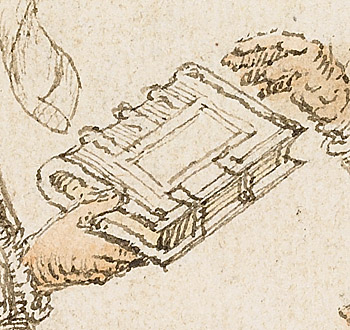Octavian
General Information
Plot Summary

[Note: This summary is based on the Northern version (IMEV 1918)]
After seven childless years, the wife of Octavian, Emperor of Rome, finally gives birth to twins. His mother accuses the Empress of adultery and hides a false lover in her bed, whom Octavian discovers and slays violently. He then holds a feast and asks his guests what should be done with an adulterous wife. The Empress’ own father unwittingly suggests that she and the children should be burned. Octavian builds a pyre, but is moved by his wife’s prayers and sends them into exile instead.
The Empress becomes lost in a forest, where both her children are carried off: the first by an ape, the second by a griffin, which is swiftly killed by a lioness. The distraught Empress boards a ship to the Holy Land, and on her way she encounters the lioness, suckling her son as one of its cubs. Though the sailors are terrified, Mary calms the animal and it travels with them to Jerusalem. The king of Jerusalem recognises the Empress and she and the lioness live in his court, where her son is christened Octavian.
Meanwhile, the other child is found by outlaws and sold to Clement, a burgess of Paris who is on pilgrimage. Returning to France, he tells his wife that the child is his own: they christen him Florent and raise him as a tradesman. To Clement’s consternation, however, Florent exchanges two oxen for a falcon, and buys a white horse for forty pounds. Clement beats him, but his step-mother realises that the child is of noble rather than mercantile lineage.
When France is besieged by Saracens, the Emperor Octavian comes to its aid. The Sultan’s daughter Marsabelle persuades a giant to kill the king of France, but her plan is foiled when Florent, dressed in Clement’s rusty armour, accepts the giant’s challenge and kills him. Marsabelle and Florent fall in love, but she returns to her father’s camp, confiding only in her maid. He returns to Paris, where he is knighted at a great feast where Clement, to the amusement of the court, offers to pay his own share. When questioned by the Emperor, he reveals that he is not Florent’s father and tells the child’s story. The Emperor realises that Florent is his son, and rewards the burgess richly.
Florent travels to the Saracen court in disguise but when Marsabelle identifies him, he narrowly escapes. Battle resumes and Florent fights bravely. His horse leaps over the Seine to greet his lover, who promises to become Christian and sets out a plan for her own rescue. She also tells him about her father’s best horse, which Clement then steals from the Saracens and Florent presents to Octavian.
The next day Florent carries Marsabelle to Paris, but his absence from the battlefield means that Octavian and the King of France are captured. Florent tries to rescue them but fails, and all the Christians are imprisoned. Word of the disaster reaches Jerusalem, and the young Octavian decides to rescue his father. He, his mother and the lioness travel to France with an army, ambush the Saracens and defeat them. He rescues the prisoners and reveals his identity, reuniting the joyful family. Marsabelle is christened and marries Florent. They all return to Rome, where Octavian’s wicked mother kills herself.
From: Maldwin Mills, Six Middle English Romances. London, J.M. Dent for Everyman, 1992.
Manuscript: Cambridge, University Library, Ff.2.38.
Manuscripts
Click a title below to search for all romances in that manuscript.